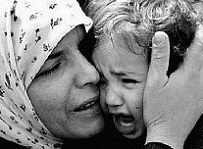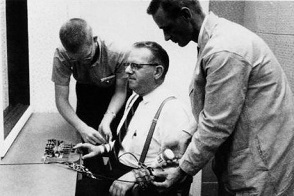 Review of 1961 Yale experiments leads researchers to revise motive for evil
Review of 1961 Yale experiments leads researchers to revise motive for evil
Review of famous Yale experiments of 1961 leads to new understanding of what allows seemingly normal people to carry out atrocities. ● The question of what prompts ordinary people to commit acts of evil has been debated by philosophers, moralists, historians and scientists for centuries. One idea that carries much weight is that almost anyone is capable of carrying out atrocities if ordered to do so. Commanded by an authoritarian figure, and wishing to conform, we could bulldoze homes, burn books, separate parents from children or even slaughter them, and our much-prized conscience would not as much as flicker. Called the "banality of evil", the theory has been proffered as an explanation for why ordinary, educated Germans took part in the Jewish genocide of the second world war. Now psychologists, having reviewed an opinion-shaping experiment carried out more than 50 years ago, are calling for a rethink. "The more we read and the more data we collect, the less evidence we find to support the 'banality of evil' idea, the notion that participants are simply 'thoughtless' or 'mindless' zombies who don't know what they're doing and just go along for the sake of it," said Alex Haslam, a professor at the University of Queensland in Australia. "Our sense is that some form of identification, and hence choice, generally underpins all tyrannical behaviour."





